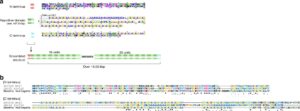DOI: 10.1038/s42003-019-0412-8
- 1. Institute for Advanced Biosciences, Keio University,
- 2. Spiber Inc.
- 3. RIKEN

From “The bagworm genome reveals a unique fibroin gene that provides high tensile strength” by Nobuaki Kono et al.. Licensed under CC-BY 4.0.
Abstract
Arthropod silk is known as a versatile tool, and its variability makes it an attractive biomaterial. Eumeta variegata is a bagworm moth (Lepidoptera, Psychidae) that uses silk throughout all life stages. Notably, the bagworm-specific uses of silk include larval development in a bag coated with silk and plant materials and the use of silk attachments to hang pupae. An understanding at the molecular level of bagworm silk, which enables such unique purposes, is an opportunity to expand the possibilities for artificial biomaterial design. However, very little is known about the bagworm fibroin gene and the mechanical properties of bagworm silk. Here, we report the bagworm genome, including a silk fibroin gene. The genome is approximately 700 Mbp in size, and the newly found fibroin gene has a unique repetitive motif. Furthermore, a mechanical property test demonstrates a phylogenetic relationship between the unique motif and tensile strength of bagworm silk.